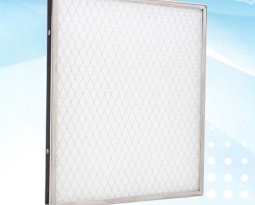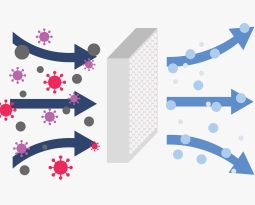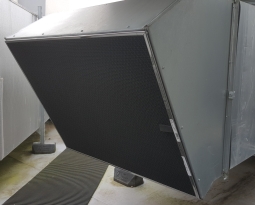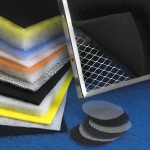 We all are making changes in our lives to stay healthy, from washing our hands to practicing social distancing. One of the most important ways we are working to “flatten the curve” is by protecting ourselves from airborne pathogens. As reported by the Environmental Health Committee, “Infections, such as influenza, SARS and M. tuberculosis (TB), have been clearly shown to have airborne disease transmission potential.” COVID-19 is no exception. While the CDC now recommends people wear masks to keep from sharing airborne pathogens, they are less effective in protecting the wearer, and more effective in protecting others. Air filters, and HVAC systems in general, can play a role in maintaining air purity. Proper air filtration can potentially reduce the risk of infection, especially in areas where many people are sharing the same interior spaces.
We all are making changes in our lives to stay healthy, from washing our hands to practicing social distancing. One of the most important ways we are working to “flatten the curve” is by protecting ourselves from airborne pathogens. As reported by the Environmental Health Committee, “Infections, such as influenza, SARS and M. tuberculosis (TB), have been clearly shown to have airborne disease transmission potential.” COVID-19 is no exception. While the CDC now recommends people wear masks to keep from sharing airborne pathogens, they are less effective in protecting the wearer, and more effective in protecting others. Air filters, and HVAC systems in general, can play a role in maintaining air purity. Proper air filtration can potentially reduce the risk of infection, especially in areas where many people are sharing the same interior spaces.
Fox Channel 13 in Memphis recommends people improve “the quality of the air inside your house” since “the air we breathe indoors can be two to five times more polluted than outdoor air.” This pollution goes far beyond viruses to include mildew, mold, dust mites, animal hair and many types of bacteria. The same report suggests that changing filters in the house “on a weekly basis” may be better than the typical monthly or quarterly schedules. But while conversations about home air quality have increased as people are instructed to stay at home, workers in congested factories, retail stores and other facilities still face an ever-increasing risk of infection.
An article from the National Air Filtration Association states that “filtration in building heating, ventilation and air conditioning (HVAC) systems can be a part of an overall risk mitigation approach,” and that while there is no direct scientific evidence to link air filtration and COVID-19, “reduced exposure can reasonably be inferred based on the ability of some filters to remove particles that contain a SARS-CoV-2 virus.”
What filter is best for your business?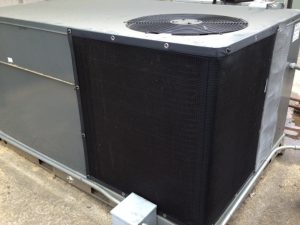
You might assume the higher-efficiency air filter the better, but higher efficiency air filters also pose some challenges. First of all, these filters may need more frequent changing as they will capture more particulate matter and clog faster. Secondly, many higher efficiency air filters can restrict air flow as they tend to contain a more dense media in order to capture smaller contaminants. Since person-to-person transmission is far more likely to spread the disease than outside particles coming into a building—from coughing and sneezing, for example—proper ventilation and air flow in and out of the building take on great importance.
That’s not to say that quality, more efficient air filters can’t play a helpful role in keeping people healthy. But using a pre-filter screen, such as the PreVent® air intake screens from Permatron, which go on the outside of HVAC units, can keep high efficiency interior filters cleaner, prolonging their life and demanding less frequent change-outs.
These filter screens are also helpful when used in conjunction with high quality HEPA filters. HEPA, which stands for High Efficiency Particulate Air, are designed to arrest very fine particles. While The Institute of Environmental Sciences and Technology mandates that a HEPA filter must be able to trap particles .3 microns or smaller, some can trap particles as small as .01 microns (as shown in this NASA study). That’s an important distinction, as the COVID-19 virus is approximately 0.125 microns in diameter—so users will want to check their HEPA class rating. HEPA filters can be expensive, so using pre-filters to keep them clean and extending their usage life can help a business’s bottom line, too.
The Many Air Filtration Advantages of Filter Screens
Pre-filters, or filter screens, have other advantages. For instance, they can greatly reduce the labor/man hours needed to maintain HVAC systems. With qualified HVAC labor stretched thin due to many “stay at home” orders, the need to reduce staffing needs is acute. But coil cleaning and replacing filters can be a burden, especially with often difficult-to-reach rooftop HVAC systems, and where access to water may be limited. HVAC units with filter screens, however, do not need cleaning as frequently. Pre-filter protected HVAC units also last longer and will likely need less repair and maintenance. Another advantage of PreVent filter screens in particular is how simple they are to install, and to care for. Cleaning PreVent filter screens can be performed by untrained staff, often using nothing more than a brush.
Keep yourself, customers, workers and others healthier with better air filtration by using quality air filters, and doing frequent cleaning and/or using pre-filters. Read our white paper Get Smart about Saving Money to learn more about the advantages of air filter screens like PreVent.


